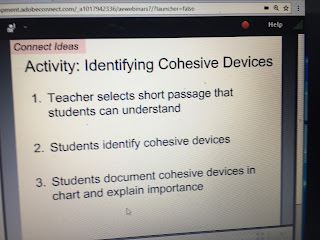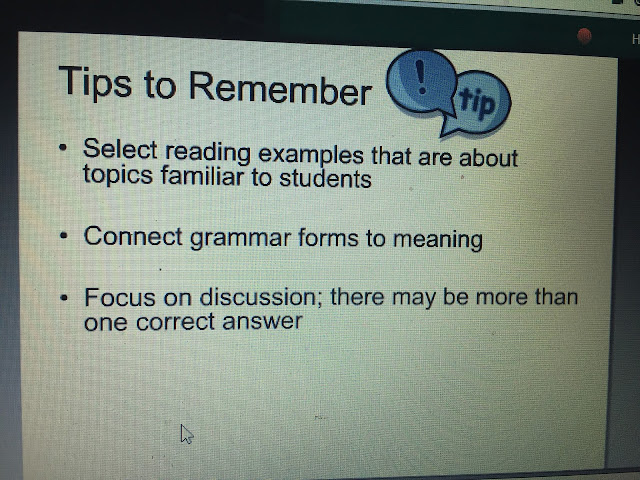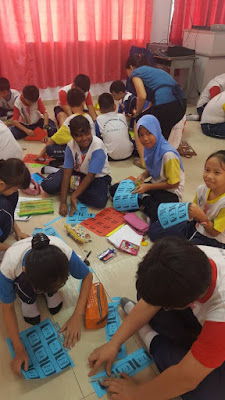Part of my creative expression is the Phonics-Toons series. It as an attempt to gap the digital generational divide. It's also a venture to create quality Phonics enhancement resources for teachers that can go beyond the classroom's whiteboard.
My Fin is Fine, is based on CVCe/ CVC vowel 'i' words. It is an opportunity for students to practice long and short vowel 'i' words. Students will get to see Magic 'e' in action. Click on the link, and read with a Smile!
Click here to view, My Fin is Fine
Sunday, 24 September 2017
Monday, 18 September 2017
AE Webinar 7.1: Connecting Reading and Writing in Grammar Teaching: A Functional Approach
We kicked off a new AE Webinar season with series 7. It was a new group, but some true-blue participants like Teacher Masnizan and Sabu were on board for their third tour of duty. Big thanks Tn Hj Ramlan Awang and Professor Aswari from UniTARKB for being gracious hosts.
AE Webinar 7.1: Connecting Reading and Writing in Grammar Teaching: A Functional Approach was moderated by Lottie Baker. The goals of the webinar were: 1. Define grammar from a functional perspective. 2. Identify 3 functions of grammar. 3. Explore classroom applications of functional grammar. Lottie defined the traditional approach as Grammar Translation when dissect text according to the parts of speech. Lottie suggested if you face national tests using grammar translation, by all means use that method. However, if you want a more communicative approach here is an alternative.
The Functional approach is shift from teaching to translate to teaching to communicate. The goal is not to know the stagnant rules of language, but to apply language to the dynamics of communication. So you are asking yourself what is a functional approach to teaching grammar? It consists of 3 big ideas: 1. Makes Meaning 2. Connect Ideas 3. Makes social relationship.
There are many advantages to this approach. It connects grammar to meaning, applies all 4 language skills and promotes critical thinking and discussion amongst other things. It useful method to teach in addition to the Translating Grammar approach required by many school systems. The functional approach is more flexible and suitable for the 21st Century Classroom.
How does language make meaning? It can be broken down int 3 main categories. The categories are Participants, Process and circumstance. Participants are the who or what performing an action (subject). The process is what are thinking, doing, feeling or being actions (verbs). Circumstances are the when, where and how process occurs.
The method's strength is the application towards speaking skills. It fosters more flexibility for students sentence create more sentence varieties. Another strength pf the method is its focus on connectors which will improve students complexity. Well enough of me talking about it, you can watch it yourself.
Click on link to watch AE Webinar 7.1
AE Webinar 7.1: Connecting Reading and Writing in Grammar Teaching: A Functional Approach was moderated by Lottie Baker. The goals of the webinar were: 1. Define grammar from a functional perspective. 2. Identify 3 functions of grammar. 3. Explore classroom applications of functional grammar. Lottie defined the traditional approach as Grammar Translation when dissect text according to the parts of speech. Lottie suggested if you face national tests using grammar translation, by all means use that method. However, if you want a more communicative approach here is an alternative.
The Functional approach is shift from teaching to translate to teaching to communicate. The goal is not to know the stagnant rules of language, but to apply language to the dynamics of communication. So you are asking yourself what is a functional approach to teaching grammar? It consists of 3 big ideas: 1. Makes Meaning 2. Connect Ideas 3. Makes social relationship.
There are many advantages to this approach. It connects grammar to meaning, applies all 4 language skills and promotes critical thinking and discussion amongst other things. It useful method to teach in addition to the Translating Grammar approach required by many school systems. The functional approach is more flexible and suitable for the 21st Century Classroom.
How does language make meaning? It can be broken down int 3 main categories. The categories are Participants, Process and circumstance. Participants are the who or what performing an action (subject). The process is what are thinking, doing, feeling or being actions (verbs). Circumstances are the when, where and how process occurs.
The method's strength is the application towards speaking skills. It fosters more flexibility for students sentence create more sentence varieties. Another strength pf the method is its focus on connectors which will improve students complexity. Well enough of me talking about it, you can watch it yourself.
Click on link to watch AE Webinar 7.1
Wednesday, 6 September 2017
SJkC Jinjang 1 & 2 English-o-rama
It was a warm welcome back to the friendly confines of SJKC Jingjang. I was greeted by the dynamic duo Puan Lim (GB SJKCJ2) and Mr. Tiong (SED). The crack English teaching squad of SJKCJ2 and I got reacquainted. Note to mention Teacher AB who I hadn't seen in a year. That's right, you read correctly, there 2 ABs in the house for this English Event. The students, about 85 mixed ability Year 6 students, were charged.
After a brief intro, the game was afoot. We started with one of my fave questions, "Is easy English easy to learn?" I was able to elicit genuine responses and the majority felt English was difficult to learn. Since the crowd was diagnosed, it was time for so motivational English meds (non-pharma, of course). A quick survey determined the almost of the students knew how to play ping pong. Therefore, we watched Ibrahim Hamadtou inspires us by playing ping pong without any arms. The questioned was posed to the crowd, "Is it easier to learn English or play ping pong without arms?" They unanimously agreed learning English is easy. The entire crowd was tuned up with the "Yes, I can" attitude.
Our object was to review grammar and make it fun. It is important to note, games are a tool of enrichment, not a substitute for teaching. The students watched Schoolhouse Rock videos on nouns, verbs, adjectives and verbs. After each parts of speech, the students were given 2 minutes to make a list of the nouns, verbs and adjectives.
Next, we shifted gears and learned how to write with sentence variety. Students reviewed terms: simple, compound and complex sentences. Students learned FANBOYS and successfully completed simple and compound sentence scramble tasks. Next, we played round of Judge Jody to discern complete from incomplete sentences. The group's grammar proficiency and confidence was growing.
In the afternoon session we quickly turned our focus on apostrophes. We reviewed terms of contractions and possessives. Students cheerfully played a round on of Cracking Down On Possession. In pairs, they completed a worksheet on apostrophes. Afterwards, students rotated in pairs around the room on 32 Apostrophe tasks cards stations.
The final session was amped up. The students had been primed with review from the day before. Students played a few rounds of living sentences to practice sentence structure. They were thrilled with Parts of Speech Uno. The teachers marveled over the enthusiasm of the crowd. They played in groups of 6 and had many opportunities to apply the parts of speech. It was going to be hard to top the last activity, but the finale was power packed. We went outside and played a few rounds of Parts of Speech Vocabulary Water Balloon Toss. It was big splash and a perfect end to some dynamic English days.
After a brief intro, the game was afoot. We started with one of my fave questions, "Is easy English easy to learn?" I was able to elicit genuine responses and the majority felt English was difficult to learn. Since the crowd was diagnosed, it was time for so motivational English meds (non-pharma, of course). A quick survey determined the almost of the students knew how to play ping pong. Therefore, we watched Ibrahim Hamadtou inspires us by playing ping pong without any arms. The questioned was posed to the crowd, "Is it easier to learn English or play ping pong without arms?" They unanimously agreed learning English is easy. The entire crowd was tuned up with the "Yes, I can" attitude.
Our object was to review grammar and make it fun. It is important to note, games are a tool of enrichment, not a substitute for teaching. The students watched Schoolhouse Rock videos on nouns, verbs, adjectives and verbs. After each parts of speech, the students were given 2 minutes to make a list of the nouns, verbs and adjectives.
Next, we shifted gears and learned how to write with sentence variety. Students reviewed terms: simple, compound and complex sentences. Students learned FANBOYS and successfully completed simple and compound sentence scramble tasks. Next, we played round of Judge Jody to discern complete from incomplete sentences. The group's grammar proficiency and confidence was growing.
In the afternoon session we quickly turned our focus on apostrophes. We reviewed terms of contractions and possessives. Students cheerfully played a round on of Cracking Down On Possession. In pairs, they completed a worksheet on apostrophes. Afterwards, students rotated in pairs around the room on 32 Apostrophe tasks cards stations.
The final session was amped up. The students had been primed with review from the day before. Students played a few rounds of living sentences to practice sentence structure. They were thrilled with Parts of Speech Uno. The teachers marveled over the enthusiasm of the crowd. They played in groups of 6 and had many opportunities to apply the parts of speech. It was going to be hard to top the last activity, but the finale was power packed. We went outside and played a few rounds of Parts of Speech Vocabulary Water Balloon Toss. It was big splash and a perfect end to some dynamic English days.
 |
| AB and AB |
Sunday, 3 September 2017
SJKC Jinjang2 Teacher Training
It was a Tuesday afternoon on the 12th of July. SJKC English teachers from all over Kuala Lumpur started to pour into the 3rd Floor Training room at SJKC Jinjang2. There were over 100 teachers representing approximately 24/42 of the SJKC schools in Kuala Lumpur. The teachers were interested in blended education and best practices. The event was arranged by the prolifically productive pair, Puan Lim, the principal of SJKCJ2, and Mr. Tiong from the Sentul Education Dept.
The event started with a short video about learning English in China and how English is the hot and trendy topic in the entire region. Teachers were reminded how they are in the right place at the right time. We jumped into a quick demo of Frog E-bahan. Teachers were introduced to the large cache of phonics friendly and KSSR relevant teaching materials. We demonstrated Sam the Snake (S,A,T, P) for the lower primary teachers. We previewed Looking For Gold for the upper primary teachers. Teachers were intrigued about the pertinent nature of E-bahan.
I selected a few apps to demonstrate to gung-ho group of teachers. I’m still evolving my technique present apps during training. Teachers were exposed to Grasshopper Apps: Sight Words Ninja and Comparative Adjectives. We also looked at Alligator Apps Action words. These are digital savvy ways to connect the student to learning English beyond the classroom. Since mobile phones are ubiquitous feature of modern life, it is a desirable medium for continued English language learning.
As form of best practices we reviewed the Dynamic English Days program. The feedback from the teachers and students was so good we decided to showcase. It is always important to review a concept that has been previously taught before playing games.
Games are not meant to teach concept, their purpose is to enrich concepts. We went play by play through the event and occasionally Mr. Tiong or one of the teachers would weigh in. It was no surprise, Parts of The Speech Uno was the most popular. All the resources presented were shared with the teachers via google drive or pen drives.
I also shared my renewed enthusiasm with systematic phonics with lower primary teachers. I told them how I have been teaching online with English language learners (Ell) in China. How I have witnesses the magic of true beginners to become beginner readers in less than 3 months via systematic phonics. The teachers were reassured systematic phonics is not a perfect system, but it is the most effective system for literacy. It is not a theory, it is a fact supported by volumes of evidence.
The teachers were introduced to a few of my favorite phonics websites as an additional resource. I could lot of support and love form Puan Lim's Dream Team of Teachers. All the teachers from the various schools shared a mutuality mindset and were poised to do more blending. You might be aware of a'bad hair' day, well I had a wonderful 'bad turban' day, lol.
Subscribe to:
Comments (Atom)














































